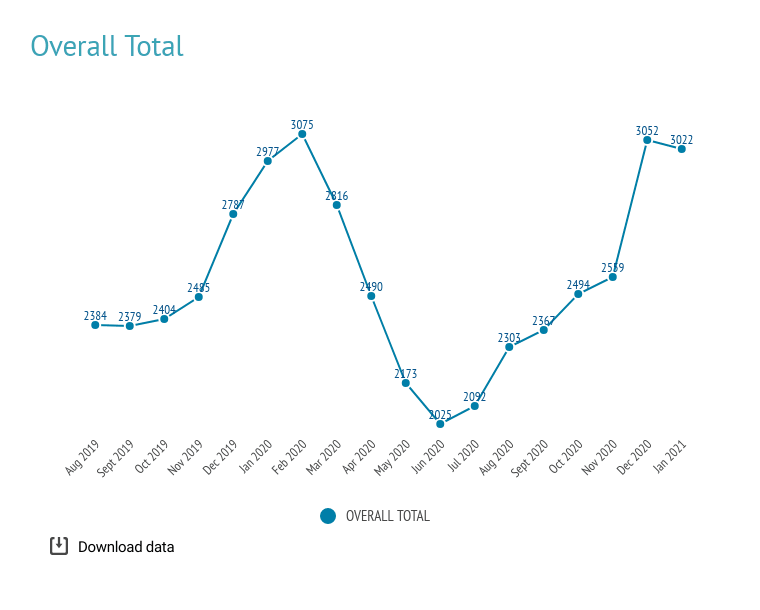Courtney LaCaria
Housing & Homelessness Research Coordinator
Mecklenburg County Community Support Services
Mary Ann Priester
Homeless Management Information System (HMIS) System Coordinator
Mecklenburg County Community Support Services
Mecklenburg County Community Support Services first released the “One Number” in 2019 as part of the annual Charlotte-Mecklenburg State of Housing Instability & Homelessness Report. Since that initial release, the One Number has become the “go-to” number for how many people are experiencing homelessness in Charlotte-Mecklenburg.
The One Number is found on the Housing Data Snapshot, a hub for the latest information related to housing and homelessness in Charlotte-Mecklenburg. Generated from a By-Name List within the Homeless Management Information System (HMIS), the One Number captures the number of people enrolled in Emergency Shelter, Transitional Housing, Street Outreach, Rapid Re-housing (if there is no move-in date to housing yet), and Coordinated Entry inventories in HMIS. The One Number includes both sheltered homelessness and a portion of the individuals experiencing unsheltered homelessness in Charlotte-Mecklenburg. In addition, the One Number can be broken down by both household composition and population type; elements include single individuals, families, unaccompanied youth, veterans, and people experiencing chronic homelessness. The One Number can also be analyzed by inflow to, and outflow from, homelessness. By comparing One Number data over time (including by household composition and by inflow/outflow), the community can identify trends. Once identified, these trends can then inform interventions. To read more about how the One Number works, click here.
This week’s blog post provides the latest One Number update; trends and analysis; and what this means for Charlotte-Mecklenburg.
LATEST DATA & TRENDS
As of January 31, 2021, there are 3,022 individuals experiencing homelessness in Charlotte-Mecklenburg. This total includes 1,830 single individuals (of which 86 are unaccompanied youth); and 363 families (comprised of 1,228 people). Included in the total of 3,022 individuals are 254 homeless Veterans and 529 individuals who are experiencing chronic homelessness.
To view the historical data, including this trend, please click here.
Considering inflow (into homelessness) and outflow (out of homelessness), below are trends to note:
- Between December 2020 and January 2021, there was a 30 person decrease in the total number of people experiencing homelessness. However, this still represents a 997 person increase since June 2020, when the trend shifted from to an increase in total homelessness. As context, it is important to note that, during this period and in response to COVID-19, the community’s temporary shelter capacity has increased. This could also reflect an increased need for housing assistance as a result of the pandemic.
- Between December 2020 and January 2021, the number of families decreased by 12, whereas the number of single individuals increased by 53. In addition, Veterans experiencing homelessness increased by 12 individuals; people experiencing chronic homelessness increased by 25 individuals.
- Homelessness data, disaggregated by race and ethnicity was released last week, including data for January 2021. To read more about the race and ethnicity data trends, please click here. Moving forward, this dataset will be updated as part of the monthly One Number update.
SO, WHAT
The One Number is the best snapshot available for the number of people experiencing homelessness in Charlotte-Mecklenburg. But, like all data, the One Number also has limitations. First, it is still an undercount of all people experiencing homelessness. It does not (yet) include all households experiencing homelessness through residency in hotels and/or motels; or living in “doubled up” situations with family and/or friends. Therefore, it is helpful to think of the One Number as the floor: it is the most accurate minimum count of the number of people actively experiencing homelessness in the community. As the latest One Number indicates, the minimum number of people (adults and children) experiencing homelessness (and therefore, the minimum number of housing units and/or subsidies needed right now) in Charlotte-Mecklenburg is 3,022.
The national eviction moratorium enacted by the U.S. Centers for Disease Control and Prevention was extended to March 31, 2021. This has slowed, but not fully stopped the inflow into homelessness. On February 22, the U.S. Department of the Treasury released a new FAQ to help states and communities distribute the $25 billion in Emergency Rental Assistance. The FAQ addresses many of the flaws in the previous guidance; it also includes components that incorporate lessons learned from an analysis of the over 600 state and local emergency rental assistance programs. The updates in the new FAQ include: self-attestation allowed by renter households to meet most eligibility criteria; shortened time frame to provide assistance directly to tenants in cases where a landlord does not want to participate in the program; expansion of eligible costs such as internet needed for distance learning, teleworking, and telehealth purposes; option to use some of the funds for legal assistance in certain conditions; and ability to use up to 10% of the funds for stability services.
Reducing housing instability through prevention, eviction moratoria, and other interventions is the only way to reduce or eliminate new entries into homelessness. By reducing inflow, the individuals and families who need to be re-housed will face less competition for resources to exit from homelessness. It is, therefore, vital that emergency rental assistance be distributed efficiently to the households who are in greatest need of it, first.
SIGN UP FOR BUILDING BRIDGES BLOG
Courtney LaCaria coordinates posts on the Building Bridges Blog. Courtney is the Housing & Homelessness Research Coordinator for Mecklenburg County Community Support Services. Courtney’s job is to connect data on housing instability, homelessness and affordable housing with stakeholders in the community so that they can use it to drive policy-making, funding allocation and programmatic change.
Mary Ann Priester is the Homeless Management Information System (HMIS) System Coordinator for the Charlotte-Mecklenburg Continuum of Care (CoC). She provides data quality, security, and privacy oversight for the local HMIS system and technical support and training to 25+ agencies that serve individuals and families who are homeless or at risk of homelessness. Mary Ann also oversees data collection for the Point-in-Time Count.


